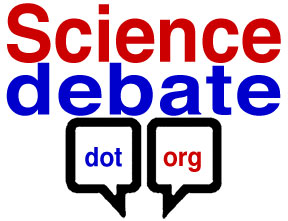 Since our last post, “Putting Science Higher On the Public Agenda,” A collaboration of local science organizations and scientists have put together six questions for governor candidates to answer, much like the questions President Obama and Mitt Romney had answered in September this year.
Since our last post, “Putting Science Higher On the Public Agenda,” A collaboration of local science organizations and scientists have put together six questions for governor candidates to answer, much like the questions President Obama and Mitt Romney had answered in September this year.
They believe these answers belong in the upcoming live debates for Washington governor candidates, as well as posted for the public to see.
Here are the six questions:
- Innovation and the Economy. Science and technology have been responsible for over half of the growth of the U.S. economy since WWII, when the federal government first prioritized peacetime science mobilization. But several recent reports question America’s continued leadership in these vital areas. What policies will best ensure that Washington State remains a world leader in innovation?
- Climate Change. The Earth’s climate is changing and there is concern about the potentially adverse effects of these changes on life on the planet. What is your position on cap-and-trade, carbon taxes, and other policies proposed to address global climate change—and what steps can we take to improve our ability to tackle challenges like climate change that cross state and national boundaries?
- Education. Increasingly, the global economy is driven by science, technology, engineering and math, but a recent comparison of 15-year-olds in 65 countries found that average science scores among U.S. students ranked 23rd, while average U.S. math scores ranked 31st. In your view, why have our students fallen behind over the last three decades, and what role should the Washington State government play to better prepare students of all ages for the science and technology-driven global economy.
- Ocean Health. Scientists estimate that 75 percent of the world’s fisheries are in serious decline, habitats like coral reefs are threatened, and large areas of ocean and coastlines are polluted. What role should the Washington State government play in protecting the environmental health and economic vitality of the oceans?
- Vaccination and public health. Vaccination campaigns against preventable diseases such as measles, polio and whooping-cough depend on widespread participation to be effective, but in some communities vaccination rates have fallen off sharply. What actions would you support to enforce vaccinations in the interest of public health, and in what circumstances should exemptions be allowed?
- Science in Public Policy. We live in an era when science and technology affect every aspect of life and society, and so must be included in well-informed public policy decisions. How will you ensure that policy and regulatory decisions are fully informed by the best available scientific and technical information, and that the public is able to evaluate the basis of these policy decisions?
These questions were developed in partnership with sciencedebate.org, a national nonprofit that succeeded in getting the 2012 presidential candidates to answer 14 questions. Those national questions and answers can be found at sciencedebate.org.
The NW local organizations include the Northwest Science Writers Association, ScienceOnline Seattle and the Forum on Science, Ethics and Policy. They also have some key scientist supporters, including Lisa Graumlich, Dean of the School on the Environment at the University of Washington and Ed Lazowska, Bill and Melinda Gates chair of Computer Sciences at the UW.
Some of the bi organizations such as Town Hall and Pacific Science Center have supporting them as well as feisty startup Microryza (crowdsourcing research) as a smaller supporter.
The key six key questions include climate change, ocean health, vaccinations for public health, among other science areas.
For more information – Please contact the following people:
Shawn Otto, shawn@sciencedebate.org
Sally James, NSWA, info@nwscience.org– Twitter – @nswa
Jen Davison, co-founder of ScienceonlineSeattle, at UW College of the Environment
jfrdvsn@u.washingon.edu

Leave a Reply